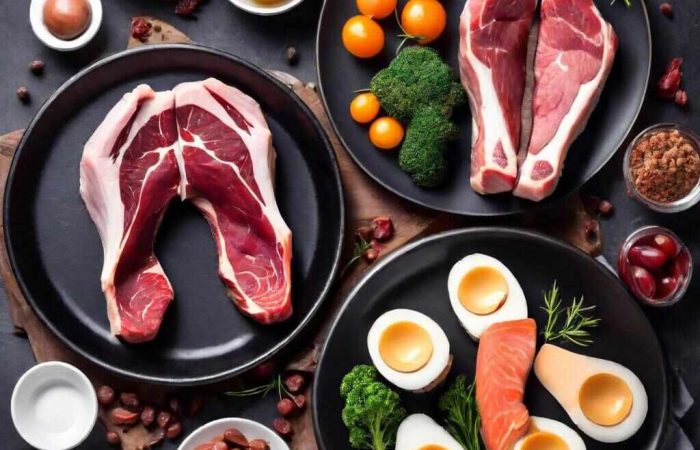
With so many options, choosing a diet plan can be difficult. Two popular low-carb diets that have been talked about are the carnivore diet and the Atkins diet.
Both diets focus on reducing carbohydrate intake, but their methods and principles differ.
In this article, we will take a closer look at the Carnivore Diet vs Atkins Diet, and discuss their main features, benefits, and possible disadvantages.
Table of Contents
ToggleCarnivore Diet vs Atkins Diet
Exploring Carnivore Diet
The carnivore diet, a highly debated dietary approach, is gaining popularity among those who want to focus on animal-based foods such as meat, fish, eggs, and dairy products. This diet is considered to be highly restrictive, as it excludes all plant foods, including commonly consumed fruits, vegetables, grains, and nuts.
On the other end of the spectrum, proponents of a vegan diet argue that consuming a plant-based diet can lead to various health benefits, including weight loss, improved mental clarity, and reduced inflammation, among others. The belief is that plant-based foods are rich in essential nutrients that can promote overall wellness and longevity.
Despite the differences between carnivore diet vs Atkins dietary approaches, one thing is clear: the foods we consume can have a significant impact on our health and wellbeing. As such, it is essential to choose a diet that is sustainable and works best for our individual needs and preferences.
Exploring Atkins Diet

The Atkins Diet was developed by Dr. Robert Atkins, a Low Carb, High Fat, High Protein Diet. Unlike a vegetarian diet, the Atkins diet allows for a wide variety of foods, including vegetables, fruits, whole grains, and nuts.
The diet consists of four stages, starting with strict carbohydrate restriction, then gradually increasing carbohydrate intake as the program progresses.
The Atkins diet also emphasizes the importance of consuming healthy fats such as those found in avocados and olive oil.
Key Differences: Carnivore Diet Vs Atkins
Carnivore Diet
Foods
Carnivore diets focus only on animal foods excluding all the fruits and vegetables, whereas the Atkins diet allows for a wide range of choices, including plant-based foods.
Carbohydrate intake
Carnivore diet aim for no or low carbohydrate intake, whereas the Atkins diet increases carbohydrate intake as the meal progresses.
Diet
Carnivore diets are high in protein and fat, while the Atkins diet emphasizes a balance of protein, fat, and carbohydrates, but the amounts vary depending on the stage.
Benefits of Carnivore Diet Vs Atkins Diet
Carnivore Benefits
1. Simplifies food choices
Focusing on animal products makes meal planning easier by eliminating complex decisions and streamlining your eating habits.
With the carnivore diet, you focus on consuming animal-based foods exclusively, such as meat, fish, eggs, and dairy, while excluding all plant-based foods.
To sum it up, the carnivore diet simplifies food choices by providing clear guidelines, reducing decision fatigue, streamlining meal preparation, enhancing compliance, and eliminating potential food sensitivities associated with plant-based foods.
It allows you to focus on nutrient-dense animal-based options, making your dietary journey more straightforward and effective.
Potential Weight Loss Benefits

The high protein and fat content of vegetarian diets makes you feel fuller, reducing calorie intake and potentially weight loss through:
- Elimination of processed foods and sugar.
- Increased satiety from protein and healthy fats.
- Potential caloric restriction.
- Improved insulin sensitivity.
- Reduction in water retention.
These factors can contribute to weight loss on the carnivore diet.
Improved Blood Sugar Control
Carnivore diets contribute to “Improved Blood Sugar Control” through several mechanisms.
Low carbohydrate intake:
Carnivore diets limit the intake of carbohydrates, especially those from processed foods and grains.
The restriction of carbohydrates is a key factor in improved blood sugar control on a carnivore diet.
This reduction in carbohydrate intake minimizes the amount of glucose that enters the bloodstream, lowering blood sugar levels and improving blood sugar control.
Stable insulin levels:
Carnivores’ diets consist primarily of animal foods that are low in carbohydrates and high in protein and fat, resulting in more stable insulin levels.
Stable insulin levels on a carnivore diet are due to its low carbohydrate, high protein and fat composition.
This prevents insulin spikes, reduces the risk of insulin resistance, and improves blood sugar regulation.
Ketogenic state:
A carnivore diet can induce a state of ketosis, where the body relies primarily on fat for fuel rather than carbohydrates.
This metabolic state also helps to stabilize blood sugar levels reducing the need for glucose.
In ketosis, blood sugar levels tend to stabilize because the body efficiently uses ketone bodies for energy, reducing the need for glucose and minimizing fluctuations in blood sugar levels.
Lower glycemic load:
Avoiding high-glycemic carbohydrates such as sugar, grains, and starchy vegetables lowers the overall glycemic load of your diet.
By reducing high-glycemic carbohydrates from the diet, carnivore diets help to lower the overall glycemic load and improve blood sugar control.
This means less spikes in blood sugar levels, better blood sugar control, and lower risk of insulin resistance.
Weight loss and improved insulin sensitivity:
The potential for weight loss from carnivore diets may contribute to improved glycemic control.
Weight loss resulting from a carnivore diet can also contribute to improved glycemic control by increasing insulin sensitivity.
Obesity and body fat are associated with insulin resistance, and weight loss from a carnivore diet may increase insulin sensitivity and lead to improved glycemic control.
In conclusion, by limiting carbohydrate intake, stabilizing insulin levels, promoting a ketogenic state, minimizing glycemic load, and facilitating weight loss, a carnivore diet can lead to significant improvements in blood sugar control and glycemic regulation.
Benefits Of The Atkins Diet

Balanced diet
The Atkins diet provides the benefits of a “balanced diet” through several important aspects. A simple explanation of how the Atkins diet brings balance.
Adequate protein intake:
The Atkins diet focuses on consuming moderate to high amounts of protein, which is essential for many functions in the body. Protein helps build and repair tissue, supports muscle building, and promotes satiety, making it an important part of a balanced diet.
Healthy fats:
The Atkins diet encourages healthy fats, which can be found in foods such as avocados, nuts, seeds, and fatty fish. These fats provide essential fatty acids, promote brain health, aid in nutrient absorption, and contribute to overall nutritional balance.
Nutrient-dense vegetables:
While the Atkins diet is low in carbohydrates, it emphasizes the importance of nutrient-dense vegetables. These include leafy greens, cruciferous vegetables, and colorful options that provide essential vitamins, minerals, and fiber needed for optimal health.
Controlling Carbohydrate Intake:
The Atkins Diet focuses on controlling carbohydrate intake by prioritizing nutritious, low-carbohydrate options. This approach balances carbohydrate sources with other essential nutrients to ensure a balanced diet.
Personalized Approach:
The Atkins Diet offers flexibility based on your individual needs and goals. It offers different stages that allow for a gradual reintroduction of carbohydrates while maintaining balance and control of nutrient absorption.
Long-term sustainable approach
Compared to the restrictiveness of a carnivore diet, the Atkins diet is more sustainable in the long-term due to its simplicity
Improves heart health:
The Atkins diet focuses on consuming healthy fats, which can affect heart health.
Disadvantages to consider
1. Malnutrition:
A carnivorous diet lacking plant-based foods results in a lack of fiber, vitamins, and minerals.
2. Sustainability:
The restrictive nature of carnivores is difficult to maintain in the long term and can lead to dietary boredom and social exclusion.
3. Potential Health Risks:
Excess saturated fat and cholesterol in both foods can be dangerous for people with health problems such as heart disease.
Carnivore Diet vs Atkins: Bottom Line
The Carnivore Diet Vs Atkins Diet are two low-carbohydrate diets that have been touted for their benefits.
While Carnivore diet take a more extreme approach and eliminate all plant-based foods, the Atkins diet offers a simpler, more balanced approach.
Ultimately, choosing between the Carnivore diet vs Atkins diet will depend on your personal preferences, health goals, and considerations.
Before starting any dietary changes, it is important to consult your doctor or registered dietitian to ensure that the changes meet your needs and health condition.
Both the Carnivore diet and Atkins diet have the potential to promote weight loss, but the rate of weight loss can vary depending on individual factors such as metabolism, adherence to the diet, and overall calorie intake.
The healthiness of the Carnivore diet versus the Keto diet is subjective and depends on individual factors such as personal health goals, nutrient intake, and any underlying health conditions.